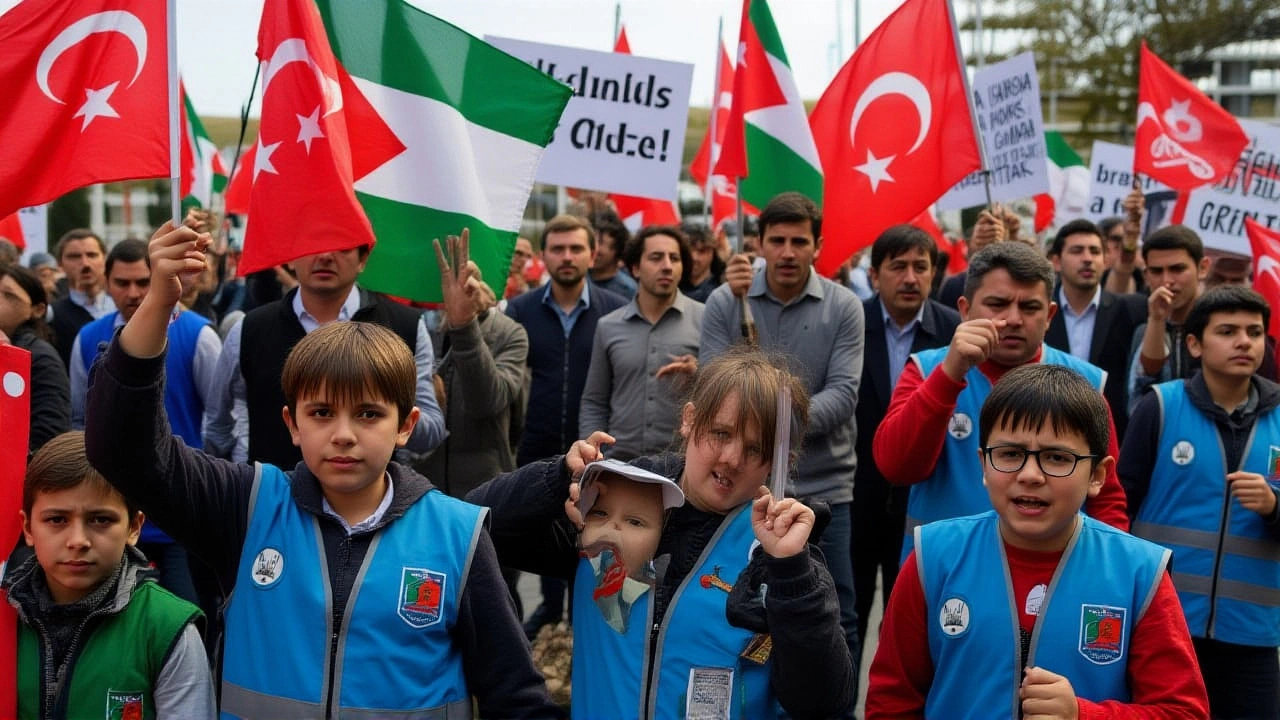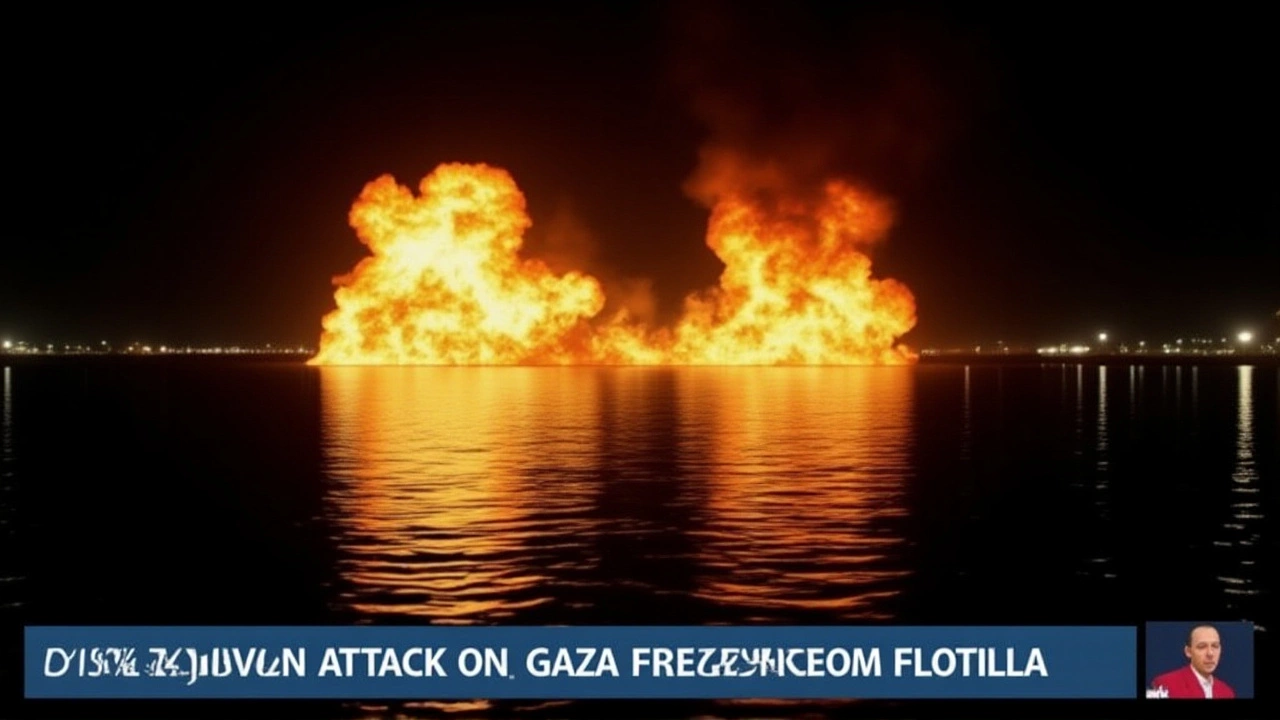In the pre‑dawn hush of May 2, 2025, a drone attack rocked a humanitarian convoy sailing toward Gaza, igniting a fire aboard the vessel Conscience. The ship, flagged to Palau and part of a mission organized by the Freedom Flotilla Coalition, was struck by two missile‑bearing drones at 00:23 CEST while anchored 17 nautical miles (31 km) east of Malta. Among the roughly 20 activists on board was Swedish climate activist Greta Thunberg, who had joined the effort to challenge Israel’s naval blockade of the Gaza Strip.
Background: The Gaza blockade and maritime convoys
Since 2007 Israel has imposed a naval embargo on the Gaza Strip, citing security concerns. Humanitarian groups, however, argue that the blockade amounts to collective punishment under international law. Over the past decade, several “freedom flotillas” have attempted to breach the cordon, delivering food, medicine, and medical equipment. The 2025 convoy was the latest attempt, intended to bring critical supplies and draw global attention to what activists describe as a humanitarian crisis.
The Freedom Flotilla Coalition announced the mission on April 24, stating that the convoy would depart from Bizerte, Tunisia on April 29, pick up additional aid in Malta, and then sail toward Gaza. Organizers said the convoy would carry roughly 200 tons of food, water purification kits, and medical consumables, as well as a roster of activists from 12 countries.
Details of the May 2 attack
According to the coalition’s live‑streamed footage, two unmanned aerial systems approached the Conscience just after midnight. The drones released what appeared to be shoulder‑fired missiles that slammed into the vessel’s forward generators. The impact created a breach in the hull, flooding the forward compartment and igniting a blaze that quickly spread to the engine room.
- Time of strike: 00:23 CEST, May 2, 2025
- Location: 17 nautical miles east of Malta, outside territorial waters
- Casualties: No fatalities reported; crew and activists evacuated to safety vessels
- Damage: Hull breach of ~2 meters, fire in generator room, risk of sinking
- Distance from Israel: ~1,200 miles (1,900 km)
The coalition posted short clips showing smoke and the sound of two explosions, but independent verification remains pending. Communications with the ship were lost shortly after the strikes, and the drones were reported to have lingered overhead for several minutes.
Reactions from the field
“We did not sign up for this kind of violence,” Greta Thunberg said in an on‑board interview recorded before evacuation. “When governments fail to act, activists become the last resort. This mission was never meant to be a battlefield.”
Thunberg added that 16 governments had signed an open letter backing the flotilla, yet Sweden – her home country – had offered only “political rhetoric.” She quoted Sweden’s vice‑prime minister saying, “Israel is doing the world a favour,” calling the remark “absolutely outrageous.”
The Israeli Defense Forces issued a brief statement: “We are aware of reports of an incident involving unmanned aircraft near the Maltese maritime zone. An investigation is underway. The event occurred well beyond the operational reach of Israeli forces, roughly 1,200 miles from our coastline.” The statement stopped short of assigning blame.

Legal and humanitarian implications
International law obliges states to ensure humanitarian aid reaches civilians in conflict zones, provided it is not diverted for military use. Critics argue that Israel’s blockade violates the Fourth Geneva Convention, while Israel maintains that the restrictions are a lawful response to security threats from Hamas.
Legal scholars note that the attack, if proven to be a state‑sponsored act, could constitute a violation of the United Nations Convention on the Law of the Sea (UNCLOS), which protects freedom of navigation in international waters. However, attribution remains murky; the drones were not instantly identifiable as belonging to any nation.
Humanitarian NGOs, including the International Committee of the Red Cross, have condemned the use of force against a civilian vessel. “Targeting a ship carrying medical supplies and volunteers is a dangerous escalation,” said a spokesperson for Médecins Sans Frontières, who were not directly involved in the convoy but have worked in Gaza for years.
What’s next for the flotilla and aid to Gaza?
After the attack, the remaining vessels in the convoy redirected to the port of Valletta, Malta, where they off‑loaded the undamaged cargo and provided assistance to the injured crew. The Freedom Flotilla Coalition announced plans to regroup and attempt another sail‑through later in the summer, pending a thorough safety assessment.
Meanwhile, diplomatic pressure is mounting. The European Union has called for an independent inquiry, and several UN member states are preparing a resolution demanding that Israel lift the blockade “in accordance with international humanitarian law.”
For activists like Thunberg, the episode underscores a growing frustration: “We do not want to be doing this. Governments must step up, not just speak about it.” Whether the next attempt will face similar threats remains an open question, but the incident has undeniably pushed the Gaza blockade back into the global spotlight.
Frequently Asked Questions
How does the drone strike affect humanitarian aid to Gaza?
The strike delayed the delivery of roughly 200 tons of food, water and medical supplies. While the cargo was later off‑loaded in Malta, the loss of the vessel and the risk of sinking have hampered future maritime missions and raise security concerns for aid organizations operating in the region.
Who is responsible for the drone attack?
At present, no party has claimed responsibility. The Israeli Defense Forces say the incident is under investigation, but the drones were observed over international waters, making definitive attribution difficult.
What legal recourse exists for the flotilla?
Activists could file a claim under the United Nations Convention on the Law of the Sea, alleging unlawful use of force in international waters. Additionally, they may seek redress through the International Court of Justice if they can prove state involvement.
Why did Sweden not support the mission?
Swedish officials cited concerns about escalating tensions and the safety of citizens abroad. The vice‑prime minister’s comment that “Israel is doing the world a favour” sparked criticism from Thunberg and civil‑society groups, highlighting a divide between official policy and public opinion.
What are the prospects for future flotilla missions?
The coalition plans to regroup and possibly launch a second sail‑through later in the summer, pending safety reviews. International diplomatic pressure and heightened media attention may deter further attacks, but the risk of escalation remains high.
